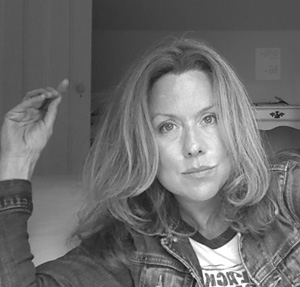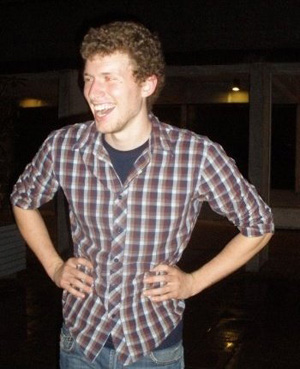A Blueprint of Life: Stefan Krecsy in Conversation with Kerry-Lee Powell

Malahat volunteer Stefan Krecsy talks with our 2013 Far Horizons Award winner, Kerry-Lee Powell, about her winning story, "Palace of the Brine."
First, I’d like congratulate you for winning The Malahat Review’s Far Horizons Award for Short Fiction! When Judge Alissa York outlined why she chose “Palace of the Brine,” she praises the character of Vlada, an ex-Soviet cleaning lady, who provides the narrator “with the closest thing she’s known to a blueprint of how to live.” To me, rather than any significant ambition or philosophy, this blueprint seems to boil down to a sort of dogged self-sufficiency and desire “to be strong enough to survive as long as [Vlada] has”; would you be willing to elaborate on this notion of strength and how it informed your writing of “The Palace of the Brine”?
Thanks, Stefan, although I’m hesitant to “boil down” Vlada into a symbol of dogged self-sufficiency as I’ve admired her from the moment she stepped into my mind with her bandy legs and mop. My father was in the Second World War and suffered terribly in his later years from post-traumatic stress disorder. His slow decline and eventual suicide made a profound impression: a great deal of my writing explores the impacts of trauma and violence on the human psyche. As a gulag survivor, Vlada is a hopeful figure to me, who after great suffering is both vibrant and capable of displaying kindness, albeit leavened with dark humor.
It’s interesting you should mention philosophy—parts of this story were directly inspired by philosopher Dan Dennett’s famous “dangerous memes” lecture, in which he describes religious and other radical movements as viruses. We inflict such devastation on millions in the name of various “isms” and imaginary beings. I’m not sure the cultural evolutionists have an adequate account for this. One of my interests in “Palace of the Brine” was to explore the murky domain beyond the wish list of morality. So many of us are, or have been, at least partially submerged there, whether by choice or by accident. I’ll add here that I worked for a time in an environment very similar to the one described in the story. I ran away from home as a teen and spent a couple of years living on the streets before I was taken in by relatives in the U.K. Some of the people and places I knew during that time resurface in my work.
I found myself intrigued by Helen’s understanding that cleaning is a sentence of “hard labour” and “hard time” that ought to be rewarded with a “tin star and a sickle.” To me, this seemed a conscious parallel to Vlada’s time in the gulag and suggests that Helen interprets her own experience through the lens of Vlada’s life. Even Helen’s first experience stripping, where she is transformed into a “naked human, knock-kneed and shivering in a draft of winter air,” evokes Vlada’s experience standing outside her gulag in winter. What drew you to this strange symmetry between a declining stripper and an ex-Soviet cleaning woman?
Both women, albeit under different circumstances, are shaped and made vulnerable by powers they struggle to understand. Agency and autonomy are tricky to define, especially in the face of external limitations, which can eventually become internalized. In the end I’m ambivalent about strip clubs, but at this point in time I guess it’s fair to say that the ability to work in the sex industry in safety and without fear of condemnation, exploitation, or abuse is the privilege of very few women.
Whether it’s Mitchell Burnhope’s dogged pursuit of the stripper Marie-Odile or her brother’s attempt to “score a spot” for Marie-Odile in a porno flick, “Palace of the Brine” is shot through with characters who strive after a progress of dubious validity or value. Indeed, the whole notion of progress seems to be questioned and undermined, both by the plot and the continual use of flashbacks. Was this a theme you set out to tackle, or did it develop as a response to the subject matter?
It’s almost a truism isn’t it, to claim that while we’ve made technological advances, we’ve made no “real” progress, having never attained the social and spiritual enlightenment envisaged by our Utopian predecessors. Joseph Brodsky writes of Hitler as a “Michelangelo in reverse,” and it strikes me that there are many ways in which the “faceless entity,” often masking itself as progressive and populist, works against the humanist philosophies that flowered during the Renaissance, something that feels evident in the paintings of de Chirico, in earlier twentieth century art photography where humans are dwarfed by Gargantuan slabs of modernist architecture, and even in the classic Western, where the diminutive human form is often pictured against an immense landscape. Organized in a certain way, we become something other than human, or at least something other than the “humanist” vision of what it is to be human. To my mind the story revolves around the question asked by the narrator after describing the drowned prostitutes in the Asian harbors: “When you know something like that, how can you go on fooling yourself about anything?” The disruptions and flashbacks obscure the unfolding narrative until the moment when Vlada and Helen understand that the anticipated beating has taken place without them having noticed.
Although this might be a reach, I couldn’t help but see in Vlada’s uncanny ability to sense “menacing, intricate systems she’s always abstractly aware of even if we’re not” a certain Ballardian overtone. I know that you will soon publish two poems in Ambit magazine (and I want to offer you my congratulations for that) and you have said before that J. G. Ballard is one of your heroes. Would you be able to comment on the importance of Ballard, and journals like Ambit, in your development as a writer?
I can’t claim J.G. Ballard as a direct influence—he’s been so thoroughly co-opted by the cyber-punk crowd that to do so misrepresents my approach. I was very influenced by Yevgeny Zamyatin’s elegant dystopian novel, We. It got me writing fiction again after a long illness. I agree that there is a bleak tone in this story, perhaps more Beckett-influenced than Ballardian. I do share with Ballard and other dystopian writers an interest in world-making, in the arbitrariness of what constitutes reality. I’m drawn, for this reason, to write about suburbs and amusement parks, the sham worlds we re-create for pleasure or status or profit. From a certain standpoint a mock-Corinthian column is a more potent signifier than the genuine artifact. I sympathize too with the frustration that led Sheila Heti to write How Should a Person Be. You don’t necessarily want to be a slave to epiphany or the other machinery of the story form. On the other hand, I’m captivated by the make-believe worlds of J. R. R. Tolkien and C. S. Lewis, by fairy tales and the lyricism of writers like Vladimir Nabokov and Truman Capote. I often feel like I’m trying to achieve a synthesis: work that is realistic, but with the heightened, almost surreal qualities of fantasy. Ambit, where Ballard was fiction editor for many years, has been publishing outstanding artwork, fiction and poetry for several decades. I’m happy to have work published in the U.K. as a chapbook of my poetry is being published in London next spring by the recently revived press, Grey Suit.
Other than Ballard, what other writers have had a formative influence on you, and what have you been reading recently?
I’ve been turning back to Henry James and D.H. Lawrence lately. I’m interested in the European/American conversation that James lingered over and his approach to aesthetics. I love Lawrence’s passionate conviction, and he’s put together some of the finest paragraphs I’ve ever encountered. Salinger’s Nine Stories is never far from my thoughts. As a teen I loved Ernest Hemingway and F. Scott Fitzgerald. On The Road was a bible that spiritualized a lot of reckless adventures. I’m still rereading William Styron and Phillip Roth, and the novels and stories of A. S. Byatt. I had a long phase of reading Eastern European and Russian literature that has had a, judging by my nightmares, cumulative effect on my imagination. I’m inspired by a lot of visual artists these days, particularly Willem de Kooning, Gerhard Richter, and Eric Fischl.
Recent Canadian books I’ve enjoyed are Michael Crummey’s fabulous Galore; Nancy Jo Cullen’s Canary; Miranda Hill’s Sleeping Funny and Steven Heighton’s The Dead are More Visible. I’m a fan of Caroline Adderson, and am looking forward to reading her novel-in-stories, Ellen in Pieces,when it’s published.
Including the Far Horizons Award, you’ve won some very substantial awards in the past few years; outside of these awards, do you have a particular character, style, piece or even phrase which you are particularly proud of from a creative standpoint?
I started writing poetry quite seriously a few years ago and I’m enormously proud that my debut collection is forthcoming from Biblioasis next year. Many of the poems in the book concern my father and were very difficult, in all senses of the word, to write.
Thank you again for all your time and your wonderful piece. Before you go, would you be willing to let the Malahat readers what you’re working on now?
I’m completing a manuscript of short fiction and I’m writing a novel. Thanks again for everything, Stefan.

Stefan Krecsy
* * * * * * * *









